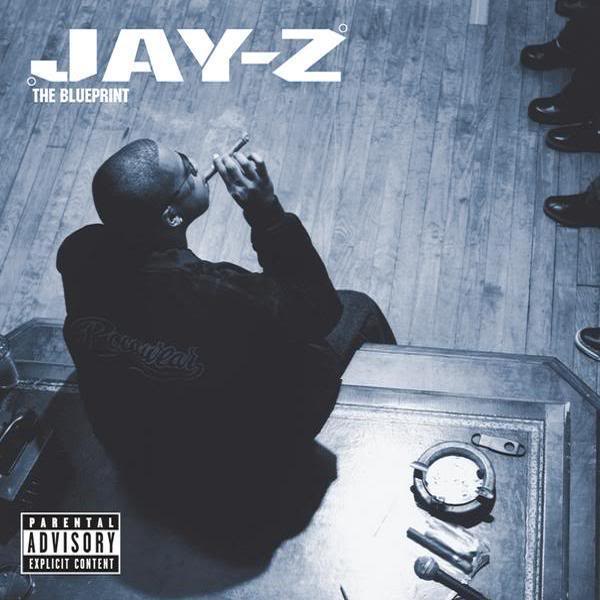
10.
Jay-Z
The Blueprint
[Roc-A-Fella; 2001]
The most well-known song on Jay-Z’s The Blueprint is “Takeover,” a Doors-sampling lyrical beatdown of then-rival Nas. Ironically, up until this point, Shawn Carter’s career was very much headed in Nas’s direction: a classic debut followed by a series of solid-but-unspectacular sequels. Then this happened. Jay-Z as we know him – the undisputed final word in the rap world, one of the few artists in any genre whose album releases are still events, and a guy who can afford to drop $100 million to buy out his own Def Jam contract – would not exist if The Blueprint wasn’t this enduring.
Jigga’s long career has been hit-or-miss to say the least, but his best albums are always the ones that find new lenses through which to filter his journey from the streets to superstardom. His debut, 1996’s Reasonable Doubt, took the conventional gangsta-rap storytelling approach and positioned him as the heir apparent to Biggie; 2003’s The Black Album found him in a more reflective mood as he contemplated retirement; for the sake of argument, you could even throw in his late-career high point, 2007’s American Gangster, on which he reinvented his story to mirror Ridley Scott’s Frank Lucas biopic of the same name. The Blueprint succeeds largely because Hov does such an effective job of emphasizing the “riches” part of his rags-to-riches tale without getting caught up in the CEO talk that has hampered lackluster recent efforts like Kingdom Come.
It is rare that we get to see a Hall of Fame-level talent this much in control of every aspect of his music for the length of an entire album. Jay breezes through player’s anthems (“Girls, Girls, Girls”), boasts (“The Ruler’s Back,” “Hola Hovito”), self-reflection (“Song Cry”), and one of the all-time great dis tracks (the aforementioned “Takeover”), unencumbered by things like skits and unnecessary guest spots (“Renegade” is the only song on the album with a guest, featuring two great verses from Eminem). And all of this is backed by as strong a wall-to-wall collection of beats as has appeared on any album you could name. In particular, Kanye West’s work on “Izzo (H.O.V.A.)” and “Heart of the City” did for his reputation what playing on Kind of Blue did for Coltrane’s. His warm, sample-heavy production style was the dominant sound in pop music this decade, and although West has released four excellent solo albums and produced countless hits for other artists, he’s never quite managed to scale these heights as a producer. If that were The Blueprint’s only contribution to music, it would still probably be the defining rap album of the post-Biggie/Tupac era. But in addition to giving 21st-century rap its signature sound, the album also turned a well-regarded star into Michael Jordan.
– Sean Highkin
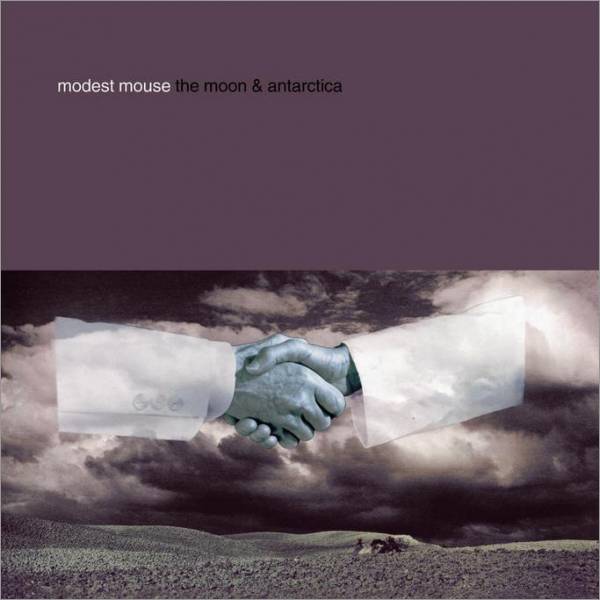
09.
Modest Mouse
The Moon & Antarctica
[Epic; 2000]
Regardless of where you stand in the debate about which of Modest Mouse’s albums is their definitive work, there is no denying that The Moon & Antarctica is their most ambitious and expansive to date.
As the title suggests, The Moon & Antarctica is wide ranging and encompassing. Opening track “3rd Planet” explains the creation and the nature of the universe in less than four minutes while the centrepiece of the album, “The Stars Are Projectors,” is a nine-minute chronicle on the frailty and beauty of life that, when listened to, feels like being sucked through a time warp and seeing your life flash before your eyes. God and the Devil are of course mentioned multiple times, and there is the consciousness of one’s own mortality presiding over the whole album.
On Modest Mouse’s earlier works Isaac Brock’s constantly cynical lyrics delivered in a harsh growl were one of their trademarks, but on Moon Brock is in a mellower and more reflective disposition. Where before he may have spat out a disparaging witticism, on this occasion his tongue exudes lavishly heartfelt similes such as “in this life like weeds, you’re a rock to me,” a clear step towards the positivity that would reward them with wider notoriety on subsequent releases.
The lyrics on Moon are certainly one of the highlights, but without their musical accompaniment they would read merely as the ramblings of an unstable alcoholic. Never is this truer than on “Tiny Cities Made Of Ashes,” where Eric Judy’s pounding bass and Jeremiah Green’s skittering drums provide the perfect platform for Brock to deliver lines about disappearing corpses and Hell freezing over. Isaac’s guitar work is also essential to the success of the album; ranging from atmospheric in the likes of “The Cold Part” to grandiose in “The Stars Are Projectors” and even playful in “Paper Thin Walls.”
The Moon & Antarctica is undeniably epic in sound and scope. The amount that Modest Mouse manage to cover in an hour is astounding and the stylish, catchy and inspiring manner in which they present it is a true achievement. There’s much too much depth to cover in this short space, and even if I had an unlimited word count it could not be done justice in mere prose; the only way to fully comprehend the magnificence is to experience it for yourself.
– Rob Hakimian
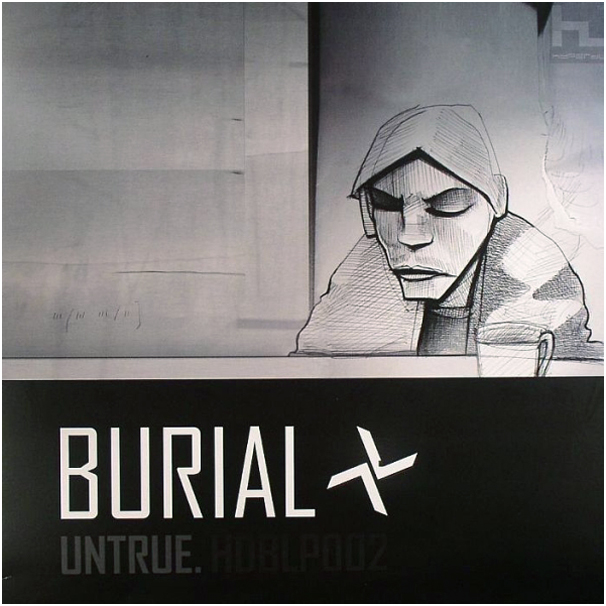
08.
Burial
Untrue
[Hyperdub; 2007]
Burial’s second LP is arguably single-handedly responsible for bringing dubstep to the (Internet) masses, for establishing dubstep as something other than just a trendy sound for kids to dance to in grimy clubs in south London, maybe even for saving electronic music outside of Europe. Released in a climate where electroclash and dancepunk had already dissolved, where minimal techno and microhouse artists were either failing to catch on or rapidly growing stale, where the disco revival was just really beginning, Will Bevan stepped in and gave us something we all could enjoy. Sure, it prompted as many frustrating “what the hell is dubstep?” questions and inquiries as anything else, and I’m sure most of the people who were asking that question in the first place still aren’t quite sure. But none of that matters; it’s easy to go on about dubstep and UK garage and all the influences and styles Untrue absorbs into its churning being, but it’s just not important in the big picture. What does matter is the music. It united people of disparate backgrounds and tastes for a reason – thoroughly immersed in sorrow and other undeniably human feelings, it’s the kind of music that’s bound to evoke a thoughtful, emotional reaction from even the staunchest of rockists. This is partly because of the way he uses vocals, taking clips and phrases from R&B and pop source material and pitch-shifting them until gender is irrelevant. This androgyny borders on unsettling but the vocals provide something familiar to latch on to, a distant light in the dark, rumbling tunnel that is Untrue. Burial’s other samples are subtler but no less astounding, taking bits and pieces from video games and god knows what else and fastidiously assembling them into little symphonies. This is the sound of stumbling through the street in the early hours of the morning, the sound of sitting in your room in the dark on a rainy night, the sound of daydreaming in pitch black – painfully aware of your surroundings, of reality, but nevertheless unable to change or control what’s really happening.
So, what does the music sound like? There’s the sound of rain, distant creaks, and inhuman moaning. There’s rattling percussion, vaguely militant, violent, but not entirely – more like a gun being taken apart rather than fired. London’s dubstep prodigy (and outright genius) invites you into his cold, bleak world from the very first second of the untitled intro and kindly attempts to warm you up, but not by kindling a cozy fire or lightening the mood. No, he warms you through the sheer energy of contact, by the motion of the sputtering, metallic drums cycling against your head, and through the heat they generate by their collisions with each other. He warms you up by relentlessly parading other peoples’ miseries: moans and anguished cries serve as distant omens, forcing you to feel better, because hey, you aren’t them – as if the only joy in Burial’s world can come from observing the suffering of others. So no, despite the rain, despite the clinking percussion, despite the tormented groans, this isn’t cold music. It’s the most enveloping and captivating music you’ve ever heard – it will wrap itself around you and suffocate you intermittently only to let you breathe again and appreciate anew all the little nuances of life. You’ll hear the floors creak, appliances hum, doors shut, and people talk; corporeal spectres will vanish right before your eyes, only to reappear behind you, singing the same depressive song. Nothing in Burial’s world sounds natural outside of those vocals – even the rain is strangely artificial. But instead of feeling cheap or fake, it has the opposite effect; the fact that not even the rain is real anymore is all the more devastating. There’s nothing else certain except for the crackle that permeates the record; indeed, after experiencing Untrue, the only thing for certain anymore is that experience. Everything else is trivial, unimportant and useless. Nothing will measure up to the sadness on display on Untrue, and certainly nothing can overcome it, so you just have to accept the inevitability. Untrue will become your life after you hear it for the first time, and pretty soon you’ll be trapped in that dark, confusing world along with all those disembodied voices.
– Andrew Ryce
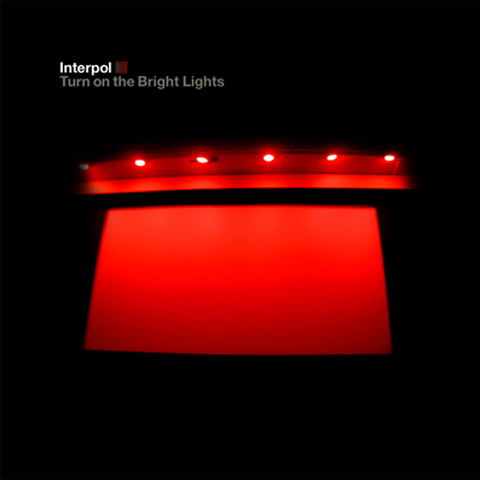
07.
Interpol
Turn On the Bright Lights
[Matador; 2002]
The debut album from this New York quartet is irrefutably the seminal album in the post-punk revival movement. The album obviously takes its cues from many classic albums, not least Joy Division’s Unknown Pleasures, but they bring a modern sheen to the whole affair.
Just as the young men like to present themselves consistently well-dressed in shirts and ties, their music is equally tidy. This is in no small part thanks to their outstanding rhythm section of bassist Carlos Dengler and drummer Sam Fogarino, whose precision leads the way through this album, particularly the higher-paced numbers like “Obstacle 1” and “PDA.”
Over the top of this the dual guitar work of Paul Banks and Daniel Kessler creates an array of soundscapes that weave in and out of each other and often completely usurp the vocals as the focal point of the song. Particularly in the second half of the album, the more dream-like numbers are completely smothered in ringing guitars, so much so that it becomes intoxicating and even suffocating. This album has a very distinct, hypnotic and brooding sound and aura. It’s most potently used on “Stella Was A Diver And She Was Always Down” or “The New,” where it works its way into your mind and fills it like an addictive, noxious drug that you want more of, though you’re not sure why.
The Strokes’ Is This It may be credited with summing up New York in the early 2000s, but Turn On the Bright Lights does this just as well at the time, though it paints a much darker and bleaker picture, and one that stands up much better today.
– Rob Hakimian

06.
LCD Soundsystem
Sound of Silver
[DFA; 2007]
Sit in an empty room with a turntable, a pen and paper, and a copy of LCD Soundsystem’s Sounds of Silver. The result is similar to what I assume BASE-jumping is like, only replacing adrenaline with unfiltered emotion. From beginning to end, Sounds of Silver elicits a cascade of feelings, from inspiration to fear to romance and back again, and when the needle lifts, you will have written in front of you the Cliff’s Notes for yourself. This album is pure introspection.
Try it. When “Get Innocuous!” comes on, you’ll be a little hesitant, but as the music layers upon itself and continuously wraps around melodic instrumentation and the first verse starts, you’ll be ready to write. You’ll journey willfully through youthful optimism as your foot taps to whichever beat you choose to follow until you finally cry out in harmony, “You can normalize, don’t it make you feel alive.”
You’ll continue on a roller coaster ride of emotions you never realized you were capable of feeling until afterwards when you’ve read your transcript back to yourself in awe. Much as the music entangles itself building tension with each track and each unique layer, you’ll find yourself knotted alongside. You’ll go from anger, to fear, to playfulness, to loneliness, with each emotion disguising itself as the other, each pulling on one another. By the title track, you’ll beg for escape, knowing true despair. You’ll feel a Shakespearean urge for resolution.
And then finally, the last two minutes of the album you’ll experience pure catharsis. The tension snaps and your psyche falls apart, pouring itself in the form of words onto the paper in front of you, the snapped elastic of the bungee cord holding you together. Read back what you wrote and I promise that you’ll know more about yourself than an hour ago.
Sounds of Silver is a complete introspective journey through your emotional foundation. With each note tension builds, emotions engage in combat, each fighting for your awareness, all the way to the perfect orgasmic catharsis. The end result of this album, when handled properly, is the Cliff’s Notes of your life.
– Eric Seemiller

05.
The Strokes
Is This It
[RCA; 2002]
You might disagree with me here – in fact, I’m sure many of you will – but I don’t think I’m going so far out on the limb when I say that the past decade was not much for rock ‘n’ roll. And what a surprise that is, considering the garage rock revival that reached its apex around 2001-2002. Maybe the reason was that the decade’s only true rock ‘n’ roll movement (and it’s eminently arguable that a revivalist hiccup isn’t really a movement) started off with, perhaps, its two best rock ‘n’ roll records – The White Stripes’ White Blood Cells and, of course, The Strokes’ masterful debut. And while some may argue with my narrative here, most would agree that try as they might (and as underrated as Room on Fire is), Julian & co. have yet to even approach recapturing the magic of Is This It. I can’t really fault them, though – Television never topped Marquee Moon, after all, and similarly, I think it’s not so much evidence of a failure of Verlaine and Casablancas to keep it together as it is the fact that you can’t top perfect. From the title track’s opening beat to “Take It or Leave It”’s final crunch, Is This It is as catchy, tuneful and – of course – cool as rock ‘n’ roll gets. I’ve listened to the record literally countless times in the past eight years – and it’s a safe bet that you’ve done the same. And while we all would like the see the boys put it together at least one more time, if they don’t, it would be as fittingly rock ‘n’ roll as every note on this magnificent record. After all, it’s better to burn out…you know the rest.
– Elias Isquith

04.
Wilco
Yankee Hotel Foxtrot
[Nonesuch; 2002]
It always catches me off guard when I remember that Wilco released this album at the beginning of the decade. We all know the story: Warner dropping the band, giving Wilco the rights to Yankee Hotel Foxtrot for free, only to have one of Warner’s independent subdivisions to release the album to wide critical acclaim months later. Most of us have seen the video footage of the creative process that went into this album, and we witnessed the uncomfortable tensions during the breaking up of Wilco’s two greatest creative forces in Tweedy and Bennett.
But what makes this album so, so special is how, despite all of chaos surrounding this album, none of that context matters. What sticks out is how perfectly sequenced this album is; in a day and age where singles reign supreme, and journalists everywhere are calling for the death of the album, Yankee Hotel Foxtrot shines as a beacon of perfection. Each song working in unison to support the last and usher in the next.
I still remember my first listen, the dissonant ending to “I Am Trying to Break Your Heart” throwing me off guard, with Tweedy randomly yelping “I’m the Man who loves you.” What a peculiar way to end a song about a person trying to break someone’s heart, right? But the peculiarity solves itself six tracks later with the resolution.
And that’s the thing about Yankee Hotel Foxtrot – it’s obvious that Wilco had painstaking control over every miniscule note and noise on this record. Without seeing the fight between Bennett and Tweedy over the 10-second transition between “Ashes of the American Flag” and “Heavy Metal Drummer,” it is still clear that these artists bled over each moment of this record. And that, at least for this reviewer, is what gives this album its lasting impression.
– Larry Weaver
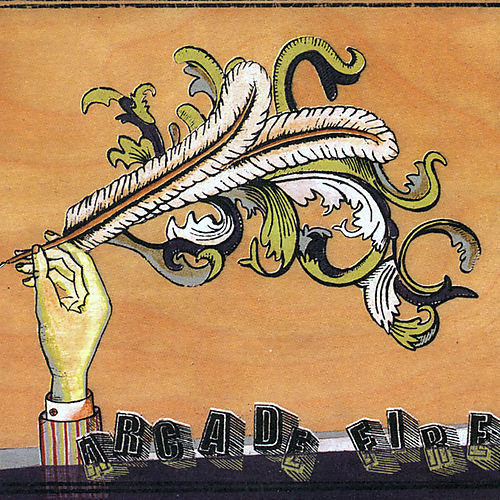
03.
Arcade Fire
Funeral
[Merge; 2004]
Could there have been a more unlikely album to define indie rock in the 2000s? The fact that the debut album did not fit into any of the three dominant indie subgenres of the decade — the Strokes/White Stripes garage-rock revival, the Killers/Franz Ferdinand ‘80s throwback trend of the middle of the decade, or the more recent art-folk movement defined by Animal Collective and Grizzly Bear — makes it a surprising pick to sum up the entire decade in indie music. But the music wins out in the end, and Funeral is the rare universally-acclaimed indie album that hasn’t lost any of its charm over the years. If possible, it actually sounds better than it did in 2004.
On paper, Funeral’s backstory sounds like a surefire recipe for a self-indulgent snoozefest; married couple Win Butler and Régine Chassagne, as well as follow band member Richard Reed Parry, all lost family members while recording this debut album, which is heavy on strings, dramatic organs, and other such theatrical flourishes. But somehow, and with a once-in-a-generation sense of self-assurance, the Montreal group managed to channel their losses into a gloriously cathartic and utterly cliché-free set of anthems that combines the best elements of Bowie, Talking Heads, U2 and Springsteen without plagiarizing any of those influences.
Funeral is impeccably paced, as the group effortlessly navigates a wide range of sudden musical shifts, often in the middle of songs like “Wake Up” and “Crown of Love.” “Rebellion (Lies),” “Neighborhood #3 (Power Out),” and the rest of these songs are gorgeously orchestrated and sound great on headphones, and will sound equally great in five years when Arcade Fire are as big as U2 and playing stadiums on a regular bases. Which is going to happen, by the way. And the scary part is that Arcade Fire have probably not even made their best album yet, hard as that is to believe. But even if they never top this debut, Funeral is the kind of album that every band dreams of making one day in their career.
– Sean Highkin
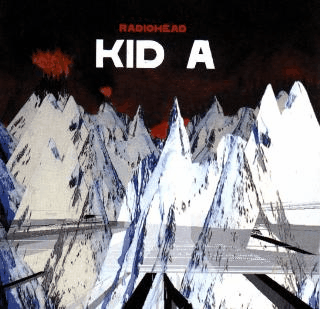
01. & 02.
Radiohead
Kid A & Amnesiac
[Parlophone / Capitol; 2000 & 2001]
Everything about Kid A and Amnesiac is out of the ordinary. Despite the fact that Radiohead’s previous album, 1997’s landmark OK Computer, debuted at number 21 in the US and went triple platinum in the UK, the British group decided to abandon their traditional three-guitar attack, opting instead for an electronic sound drawing from ambient, krautrock, classical compositions and splashes of jazz.
The ties between the two albums are many. Although they were released eight months apart, they were recorded during the same set of sessions and were even considered by the band to be released as a double album. Radiohead ultimately decided against doing this, partially to avoid being clichéd, seeing as that releasing double albums is a very proggy thing to do. Bassist Colin Greenwood has even gone as far as to call the albums “twins separated at birth.”
While Kid A has been universally lauded as the album of the decade by countless publications, it’s almost criminal how dismissive some fans and critics have been of its sister album, Amnesiac. Some fans even go as far as to dismiss it as the scraps of Kid A. But to be frank, Amnesiac can be seen as superior to its predecessor, arguably in all regards aside from sequencing. On Amnesiac, the band present the best elements of their new electronics-based Kid A sound, combined with a renewed emphasis on guitar arrangements and a natural piano sound more similar to the band’s previous releases. If “Morning Bell/Amnesiac” (a track previously seen on predecessor Kid A but with a different arrangement) serves any purpose, it’s to highlight this transformation. A once synth-driven track is now less morose, constructed with lively acoustics and brimming with percussion and keys.
Amnesiac is also home to two of Radiohead’s very finest tracks. “Pyramid Song” sees Yorke gracefully crooning over society’s misconceptions of death, resulting in an ironically heavenly climax, while “Life in a Glasshouse,” the only track recorded after these sessions, is performed with late jazz trumpeter Humphrey Lyttelton’s band. It’s Radiohead’s first and only true stab at jazz, and it’s extraordinary. I’d love to further gush over these songs here, but their pieces in the Top Tracks list should suffice.
It is somewhat fitting for these two anomalies of albums to represent this ever-so-odd decade. This, after all, is the decade in which file-sharing was introduced to the masses. Kid A, which lacked any music videos or proper singles, was able to debut at number one in the US and go platinum in the UK within its first week of release. This is irrefutably in large part thanks to the early leak of the album and its distribution through Napster.
Let’s cherish these releases, remember them, and pass them down the generations that succeed us. Let us not forget their impact or their achievement, no matter how hard it may be to do in this amnesiac society in which we live.
– Evan Kaloudis

